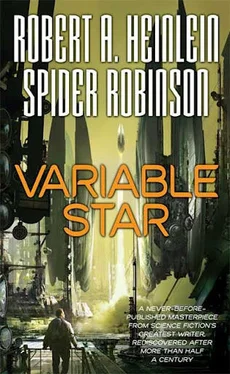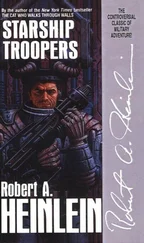If what I played had had lyrics, they would have had to be “Fuck Death,” repeated in every human tongue ever spoken.
I blew phrases that refused to end. A structure that climbed as stubbornly and relentlessly and defiantly as the one at Babel rose up from the bell of my horn. I stated a theme that had no resolution and sought none, and proved that it needed none. George R was woven in and out of it—a face whose only expression was a smile. So was London—the London we had known, whose laugh required a baritone sax to do it justice. So were both my parents. Machinist C. Platt made an appearance.
Einstein said, “People like us, who believe in physics, know that the distinction between past, present, and future is only a stubbornly persistent illusion.”
I dispelled it.
I did not take my eyes away from those of Solomon Short once. Until I saw, in his eyes, that I had won. That I had penetrated deep enough. I had forced him to see that he could feel, and not die of it. It was like watching a man in agony as the morphine hits.
Have you ever had a serious fever? The misery seems not only to last forever, but to have lasted forever—and then it goes on like that for days. But there comes a point when some kind of knot inside suddenly lets go—at the base of the throat, it feels like—and something starts to ease, or melt, or release. It’s a little like drifting off to sleep, only it leaves you more conscious. At first you can’t believe it, and then for a time you’re tearful with gratitude, and about ten minutes later you’re demanding food and the remote control.
I held on until the tearful-with-gratitude stage. I’ve mentioned my unusually accurate time sense. I knew when I’d been playing for fifteen minutes. At sixteen, I yanked the mouthpiece from my lips, chopping off short in the midst of an ascending arpeggio. It took me a ridiculous number of seconds to remember how to take in air by mouth.
Sol didn’t notice. His eyes stayed closed. At the unexpected cessation of sound he first froze, then slumped slightly.
When I had enough control back, I said formally, “The name of that piece is ‘Sol Keeps Shining.’”
Nobody said a word or moved a muscle. Except me, getting my breath all the way back and unkinking my neck.
For maybe thirty seconds he moved nothing but his nostrils and chest, so long that I was beginning to wonder if he had entered meditation.
He sat up straight then, and opened his eyes, and looked into mine, and said, “Okay.”
Anna and I bowed.
He turned to meet Dr. Amy’s gaze. “All right,” he told her. “I will.”
She nodded. “I know, Solomon.”
He addressed the room. “Thank you. You are all good people.” He turned back to me. “Except you. You haven’t even left us the option of saying ‘I’m breathless,’ you hammy bastard.”
“I could throttle you,” I offered.
“Well, you’re probably not the only one who’s had that idea lately,” he admitted.
“I’ve never been the only one with that idea,” I assured him, and noticed I was leaking tears. It didn’t seem to be a problem.
The old Solomon Short lopsided grin lit the room. “Look—”
“Yes,” I said. “We will excuse you. Love to Hideo.”
He nodded, and stood up. He bent slightly, looked up to me for permission, and kissed Anna on her upper lip. Then he straightened, and without asking my opinion kissed me firmly and wickedly on the mouth. Hal opened the door for him, and he left at once.
I started feeling better immediately. It took him four days to finish bringing the other three Relativists around—Peter Kindred took the longest—but the outcome was never in doubt from the moment when he told Dr. Amy, “Okay.”
Word got around.
The next morning, at the Horn, I looked up from my breakfast to find a complete stranger a meter away, seeking to be noticed but looking sheepish. He wanted to know if he could have a copy of “Sol Keeps Shining.” I hadn’t thought about it, but found I didn’t need to. “You’ve come to the wrong window, cousin,” I told him. “That piece and that recording both belong to Solomon Short. It was a work-for-hire, performed in his private cubic, and I’ve waived moral rights. I don’t even have a copy myself.”
He thanked me and went away, and later that day, my mailbox began to overflow with copies of “Sol Keeps Shining,” at least half sent by people I’d never met. Over the next few days, I started hearing it played all over the ship.
Later that day, Dr. Amy came down to Rup-Tooey to hug me. She pretended not to see my tears.
Strangers stopped to bow to me in the corridors. The sets I played at the Horn became full houses, of people who had come to listen. In a musician’s ultimate wet dream, I was literally commanded by my community to formally release an album of my work, so that I could sign copies of it for them.
One of Kathy’s husbands, Paul Barr, recorded and mixed it. My backup was her, a bass player named Carol Gregg, Garret Amis on guitar, and a utility infielder named Doc Kuggs filling in on this and that. Richie and Jules handled the mechanics of burning, packaging, and marketing, robbing me no more than an honest ten percent. I called it On the Road to the Stars, and included a reinterpretation of that tune.
Shortly after that Herb came up to me, grinning like a Viking after the plunder but before the rape, to inform me that a VIP of the Apple empire back on Terra wanted to know who represented me. Badly enough to pay a fortune for telepathy rather than wait 2.85 years for an answer by laser. I got Paul Hattori to represent me, and three months later my album reached number seven in the Inner System chart, and number three in the Outer. It would have time to win one major critics’ award, as well.
I couldn’t help but wonder what Jinny thought of it. But not hard, or for long. I was busy. Come to find out, a saxophone hero in a small town has absolutely no trouble getting all the dates he wants, on whatever terms suit him. Who knew?
After a few brief holy-shit experiments, I think I did pretty well resisting the temptation to be a jerk and abuse it. I kept remembering that I was always going to live in a small glass-walled town with all these people. Leaving town or planet and reinventing myself was no longer an option.
But I did have me some fun, I did. Herb actually stopped clucking over me.
Immense wealth, creative validation, System-wide fame without any downside, personal popularity, emotional support, great sex—if I’d had any idea how much fun it would turn out to be, I’d have leaped off a cliff years earlier.
It only underlined things when word reached us that the long-threatened trade war had finally broken out between Ganymede and Luna, and I discovered that I did not give the least particle of a damn.
Some of the more panicky newsnitwits back there were shrilly predicting that the conflict would not only metastasize and become Systemic, but would finally trigger the “inevitable” return of armed violence to human affairs, and destroy the Covenant. Of course they’d been saying similar things as long as I could remember, and for every one of the nearly two hundred years since the last recorded shooting war. But even when I ran it through as a hypothetical—no behavior is beyond human beings—I was mildly surprised to find how little it worried me.
Was I really that self-centered and callous? Screw you, Jack, I’m all right? I knew people back there. Nice people, who would feel great pain if someone shot them, and feel worse pain if they shot someone. Didn’t I care about them?
Sure. Theoretically. But I think we can only really worry about things that, deep down, we believe we could do something about, if we tried. I could no more affect the Solar System than I could events in Sparta, or the Land of Oz. My friends on Ganymede were going to have to look out for themselves. So were my friends on Terra, and in Luna.
Читать дальше










